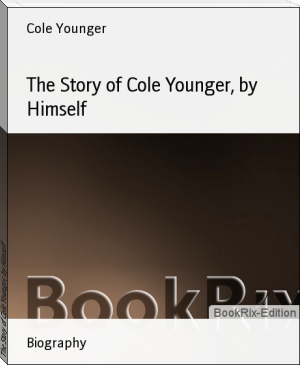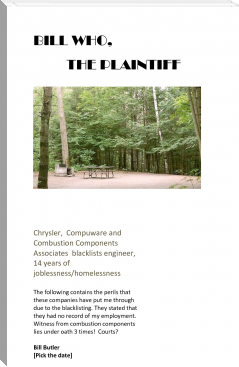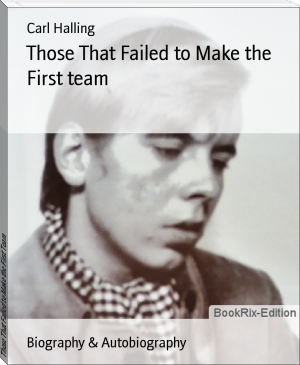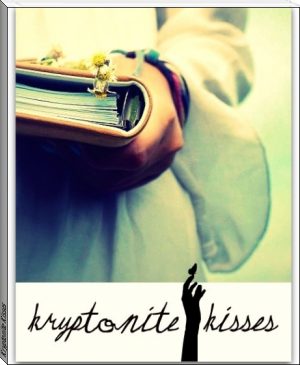The Story of Cole Younger, by Himself - Cole Younger (good novels to read in english .TXT) 📗

- Author: Cole Younger
Book online «The Story of Cole Younger, by Himself - Cole Younger (good novels to read in english .TXT) 📗». Author Cole Younger
has come over me that I not only have no desire to play cards, but it disgusts me even to see boys gamble with dice for cigars.
This last game was at a gambling house on East Third street, between Jackson and Robert streets, about half a block from the Merchants’ hotel, where we were stopping. Guy Salisbury, who has since become a minister, was the proprietor of the gambling house, and Charles Hickson was the bartender. It was upstairs over a restaurant run by Archie McLeod, who is still in St. Paul.
Chadwell and I were nearly $300 ahead of the game when Bob came along and insisted on sitting in, and we left the table. I never would play in a game where Bob was.
Early in the last week in August we started on the preliminary work for the Northfield expedition.
27. HORACE GREELEY PERRY
When we split up in St. Paul Howard, Woods, Jim and Clell Miller were to go to Red Wing to get their horses, while Chadwell, Pitts, Bob and myself were to go to St. Peter or Mankato, but Bob and Chadwell missed the train and they had me in a stew to know what had happened to them. We watched the papers, but could find nothing about any arrest, and Pitts and I bought our horses at St. Peter. I was known as King, and some of the fellows called me Congressman King, insisting that I bore some resemblance to Congressman William S. King of Minneapolis. I bought two horses, one from a man named Hodge and the other from a man named French, and while we were breaking them there at St. Peter I made the acquaintance of a little girl who was afterward one of the most earnest workers for our parole.
A little tot then, she said she could ride a horse, too, and reaching down I lifted her up before me, and we rode up and down. I asked her name and she said it was “Horace Greeley Perry,” and I replied:
“No wonder you’re such a little tot, with such a great name.”
“I won’t always be little,” she replied. “I’m going to be a great big girl, and be a newspaper man like my pa.”
“Will you still be my sweetheart then, and be my friend?” I asked her, and she declared she would, a promise I was to remind her of years later under circumstances of which I did not dream then.
Many years afterward with a party of visitors to the prison came a girl, perhaps sixteen, who registered in full “Horace Greeley Perry.”
I knew there could not be two women with such a name in the world, and I reminded her of her promise, a promise which she did not remember, although she had been told how she had made friends with the bold bad man who afterwards robbed the bank at Northfield.
Very soon afterward, at the age of eighteen, I believe, she became, as she had dreamed in childhood, a “newspaper man,” editing the St. Peter Journal, and to the hour of my pardon she was one of the most indefatigable workers for us.
A few years ago failing health compelled her removal from Minnesota to Idaho, and Minnesota lost one of the brightest newspaper writers and one of the best and truest women and staunchest friends that a man ever knew. Jim and I had a host of earnest advocates during the latter years of our imprisonment, but none exceeded in devotion the young woman who, as a little tot, had ridden, unknowingly, with the bandit who was so soon to be exiled for life from all his kin and friends.
28. THE NORTHFIELD RAID
While Pitts and I were waiting for Bob and Chadwell we scouted about, going to Madelia and as far as the eastern part of Cotton-wood county, to familiarize ourselves with the country. Finally, a few days later, the boys joined us, having bought their horses at Mankato.
We then divided into two parties and started for Northfield by somewhat different routes. Monday night, Sept. 4, our party were at Le Sueur Center, and court being in session, we had to sleep on the floor. The hotel was full of lawyers, and they, with the judge and other court attendants, had a high old time that night. Tuesday night we were at Cordova, a little village in Le Sueur county, and Wednesday night in Millersburg, eleven miles west of Northfield. Bob and his party were then at Cannon City, to the south of Northfield. We reunited Thursday morning, Sept. 7, a little outside Northfield, west of the Cannon river.
We took a trip into town that forenoon, and I looked over the bank. We had dinner at various places and then returned to the camp. While we were planning the raid it was intended that I should be one of the party to go into the bank. I urged on the boys that whatever happened we should not shoot any one.
“What if they begin shooting at us?” some one suggested.
“Well,” said Bob, “if Cap is so particular about the shooting, suppose we let him stay outside and take his chances.”
So at the last minute our plans were changed, and when we started for town Bob, Pitts and Howard went in front, the plan being for them to await us in the square and enter the bank when the second detachment came up with them. Miller and I went second to stand guard at the bank, while the rest of the party were to wait at the bridge for the signal—a pistol shot—in the event they were needed. There were no saddle horses in evidence, and we calculated that we would have a considerable advantage. Wrecking the telegraph office as we left, we would get a good start, and by night would be safe beyond Shieldsville, and the next day could ride south across the Iowa line and be in comparative safety.
But between the time we broke camp and the time they reached the bridge the three who went ahead drank a quart of whisky, and there was the initial blunder at Northfield. I never knew Bob to drink before, and I did not know he was drinking that day till after it was all over.
When Miller and I crossed the bridge the three were on some dry goods boxes at the corner near the bank, and as soon as they saw us went right into the bank, instead of waiting for us to get there.
When we came up I told Miller to shut the bank door, which they had left open in their hurry. I dismounted in the street, pretending to tighten my saddle girth. J. S. Allen, whose hardware store was near, tried to go into the bank, but Miller ordered him away, and he ran around the corner, shouting:
“Get your guns, boys; they’re robbing the bank.”
Dr. H. M. Wheeler, who had been standing on the east side of Division street, near the Dampier house, shouted “Robbery! Robbery!” and I called to him to get inside, at the same time firing a pistol shot in the air as a signal to the three boys at the bridge that we had been discovered. Almost at this instant I heard a pistol shot in the bank. Chadwell, Woods and Jim rode up and joined us, shouting to people in the street to get inside, and firing their pistols to emphasize their commands. I do not believe they killed any one, however. I have always believed that the man Nicholas Gustavson, who was shot in the street, and who, it was said, did not go inside because he did not understand English, was hit by a glancing shot from Manning’s or Wheeler’s rifle. If any of our party shot him it must have been Woods.
A man named Elias Stacy, armed with a shot-gun, fired at Miller just as he was mounting his horse, filling Clell’s face full of bird shot. Manning took a shot at Pitts’ horse, killing it, which crippled us badly. Meantime the street was getting uncomfortably hot. Every time I saw any one with a bead on me I would drop off my horse and try to drive the shooter inside, but I could not see in every direction. I called to the boys in the bank to come out, for I could not imagine what was keeping them so long. With his second shot Manning wounded me in the thigh, and with his third he shot Chadwell through the heart. Bill fell from the saddle dead. Dr. Wheeler, who had gone upstairs in the hotel, shot Miller, and he lay dying in the street.
At last the boys who had been in the bank came out. Bob ran down the street toward Manning, who hurried into Lee & Hitchcock’s store, hoping in that way to get a shot at Bob from behind. Bob, however, did not see Wheeler, who was upstairs in the hotel behind him, and Wheeler’s third shot shattered Bob’s right elbow as he stood beneath the stairs. Changing his pistol to his left hand, Bob ran out and mounted Miller’s mare. Howard and Pitts had at last come out of the bank. Miller was lying in the street, but we thought him still alive. I told Pitts to put him up with me, and I would pack him out, but when we lifted him I saw he was dead, and I told Pitts to lay him down again. Pitts’ horse had been killed, and I told him I would hold the crowd back while he got out on foot. I stayed there pointing my pistol at any one who showed his head until Pitts had gone perhaps 30 or 40 yards, and then, putting spurs to my horse, I galloped to where he was and took him up behind me.
“What kept you so long?” I asked Pitts.
Then he told me they had been drinking and had made a botch of it inside the bank. Instead of carrying out the plan originally formed, seizing the cashier at his window and getting to the safe without interruption, they leaped right over the counter and scared Heywood at the very start. As to the rest of the affair inside the bank I take the account of a Northfield narrator:
“With a flourish of his revolver one of the robbers pointed to Joseph L. Heywood, head bookkeeper, who was acting as cashier in the absence of that official, and asked:”
“ ‘Are you the cashier?’ ”
“ ‘No,’ ” replied Heywood, and the same question was put to A. E. Bunker, teller, and Frank J. Wilcox, assistant bookkeeper, each of whom made the same reply.
“ ‘You are the cashier,’ said the robber, turning upon Heywood, who was sitting at the cashier’s desk. ‘Open that safe—quick or I’ll blow your head off.’ ”
“Pitts then ran to the vault and stepped inside, whereupon Heywood followed him and tried to shut him in.”
“One of the robbers seized him and said:”
“ ‘Open that safe now or you haven’t but a minute to live.’ ”
“ ‘There’s a time lock on,’ Heywood answered, ‘and it can’t be opened now.’ ”
Howard drew a knife from his pocket and made a feint to cut Heywood’s throat, as he lay on the floor
This last game was at a gambling house on East Third street, between Jackson and Robert streets, about half a block from the Merchants’ hotel, where we were stopping. Guy Salisbury, who has since become a minister, was the proprietor of the gambling house, and Charles Hickson was the bartender. It was upstairs over a restaurant run by Archie McLeod, who is still in St. Paul.
Chadwell and I were nearly $300 ahead of the game when Bob came along and insisted on sitting in, and we left the table. I never would play in a game where Bob was.
Early in the last week in August we started on the preliminary work for the Northfield expedition.
27. HORACE GREELEY PERRY
When we split up in St. Paul Howard, Woods, Jim and Clell Miller were to go to Red Wing to get their horses, while Chadwell, Pitts, Bob and myself were to go to St. Peter or Mankato, but Bob and Chadwell missed the train and they had me in a stew to know what had happened to them. We watched the papers, but could find nothing about any arrest, and Pitts and I bought our horses at St. Peter. I was known as King, and some of the fellows called me Congressman King, insisting that I bore some resemblance to Congressman William S. King of Minneapolis. I bought two horses, one from a man named Hodge and the other from a man named French, and while we were breaking them there at St. Peter I made the acquaintance of a little girl who was afterward one of the most earnest workers for our parole.
A little tot then, she said she could ride a horse, too, and reaching down I lifted her up before me, and we rode up and down. I asked her name and she said it was “Horace Greeley Perry,” and I replied:
“No wonder you’re such a little tot, with such a great name.”
“I won’t always be little,” she replied. “I’m going to be a great big girl, and be a newspaper man like my pa.”
“Will you still be my sweetheart then, and be my friend?” I asked her, and she declared she would, a promise I was to remind her of years later under circumstances of which I did not dream then.
Many years afterward with a party of visitors to the prison came a girl, perhaps sixteen, who registered in full “Horace Greeley Perry.”
I knew there could not be two women with such a name in the world, and I reminded her of her promise, a promise which she did not remember, although she had been told how she had made friends with the bold bad man who afterwards robbed the bank at Northfield.
Very soon afterward, at the age of eighteen, I believe, she became, as she had dreamed in childhood, a “newspaper man,” editing the St. Peter Journal, and to the hour of my pardon she was one of the most indefatigable workers for us.
A few years ago failing health compelled her removal from Minnesota to Idaho, and Minnesota lost one of the brightest newspaper writers and one of the best and truest women and staunchest friends that a man ever knew. Jim and I had a host of earnest advocates during the latter years of our imprisonment, but none exceeded in devotion the young woman who, as a little tot, had ridden, unknowingly, with the bandit who was so soon to be exiled for life from all his kin and friends.
28. THE NORTHFIELD RAID
While Pitts and I were waiting for Bob and Chadwell we scouted about, going to Madelia and as far as the eastern part of Cotton-wood county, to familiarize ourselves with the country. Finally, a few days later, the boys joined us, having bought their horses at Mankato.
We then divided into two parties and started for Northfield by somewhat different routes. Monday night, Sept. 4, our party were at Le Sueur Center, and court being in session, we had to sleep on the floor. The hotel was full of lawyers, and they, with the judge and other court attendants, had a high old time that night. Tuesday night we were at Cordova, a little village in Le Sueur county, and Wednesday night in Millersburg, eleven miles west of Northfield. Bob and his party were then at Cannon City, to the south of Northfield. We reunited Thursday morning, Sept. 7, a little outside Northfield, west of the Cannon river.
We took a trip into town that forenoon, and I looked over the bank. We had dinner at various places and then returned to the camp. While we were planning the raid it was intended that I should be one of the party to go into the bank. I urged on the boys that whatever happened we should not shoot any one.
“What if they begin shooting at us?” some one suggested.
“Well,” said Bob, “if Cap is so particular about the shooting, suppose we let him stay outside and take his chances.”
So at the last minute our plans were changed, and when we started for town Bob, Pitts and Howard went in front, the plan being for them to await us in the square and enter the bank when the second detachment came up with them. Miller and I went second to stand guard at the bank, while the rest of the party were to wait at the bridge for the signal—a pistol shot—in the event they were needed. There were no saddle horses in evidence, and we calculated that we would have a considerable advantage. Wrecking the telegraph office as we left, we would get a good start, and by night would be safe beyond Shieldsville, and the next day could ride south across the Iowa line and be in comparative safety.
But between the time we broke camp and the time they reached the bridge the three who went ahead drank a quart of whisky, and there was the initial blunder at Northfield. I never knew Bob to drink before, and I did not know he was drinking that day till after it was all over.
When Miller and I crossed the bridge the three were on some dry goods boxes at the corner near the bank, and as soon as they saw us went right into the bank, instead of waiting for us to get there.
When we came up I told Miller to shut the bank door, which they had left open in their hurry. I dismounted in the street, pretending to tighten my saddle girth. J. S. Allen, whose hardware store was near, tried to go into the bank, but Miller ordered him away, and he ran around the corner, shouting:
“Get your guns, boys; they’re robbing the bank.”
Dr. H. M. Wheeler, who had been standing on the east side of Division street, near the Dampier house, shouted “Robbery! Robbery!” and I called to him to get inside, at the same time firing a pistol shot in the air as a signal to the three boys at the bridge that we had been discovered. Almost at this instant I heard a pistol shot in the bank. Chadwell, Woods and Jim rode up and joined us, shouting to people in the street to get inside, and firing their pistols to emphasize their commands. I do not believe they killed any one, however. I have always believed that the man Nicholas Gustavson, who was shot in the street, and who, it was said, did not go inside because he did not understand English, was hit by a glancing shot from Manning’s or Wheeler’s rifle. If any of our party shot him it must have been Woods.
A man named Elias Stacy, armed with a shot-gun, fired at Miller just as he was mounting his horse, filling Clell’s face full of bird shot. Manning took a shot at Pitts’ horse, killing it, which crippled us badly. Meantime the street was getting uncomfortably hot. Every time I saw any one with a bead on me I would drop off my horse and try to drive the shooter inside, but I could not see in every direction. I called to the boys in the bank to come out, for I could not imagine what was keeping them so long. With his second shot Manning wounded me in the thigh, and with his third he shot Chadwell through the heart. Bill fell from the saddle dead. Dr. Wheeler, who had gone upstairs in the hotel, shot Miller, and he lay dying in the street.
At last the boys who had been in the bank came out. Bob ran down the street toward Manning, who hurried into Lee & Hitchcock’s store, hoping in that way to get a shot at Bob from behind. Bob, however, did not see Wheeler, who was upstairs in the hotel behind him, and Wheeler’s third shot shattered Bob’s right elbow as he stood beneath the stairs. Changing his pistol to his left hand, Bob ran out and mounted Miller’s mare. Howard and Pitts had at last come out of the bank. Miller was lying in the street, but we thought him still alive. I told Pitts to put him up with me, and I would pack him out, but when we lifted him I saw he was dead, and I told Pitts to lay him down again. Pitts’ horse had been killed, and I told him I would hold the crowd back while he got out on foot. I stayed there pointing my pistol at any one who showed his head until Pitts had gone perhaps 30 or 40 yards, and then, putting spurs to my horse, I galloped to where he was and took him up behind me.
“What kept you so long?” I asked Pitts.
Then he told me they had been drinking and had made a botch of it inside the bank. Instead of carrying out the plan originally formed, seizing the cashier at his window and getting to the safe without interruption, they leaped right over the counter and scared Heywood at the very start. As to the rest of the affair inside the bank I take the account of a Northfield narrator:
“With a flourish of his revolver one of the robbers pointed to Joseph L. Heywood, head bookkeeper, who was acting as cashier in the absence of that official, and asked:”
“ ‘Are you the cashier?’ ”
“ ‘No,’ ” replied Heywood, and the same question was put to A. E. Bunker, teller, and Frank J. Wilcox, assistant bookkeeper, each of whom made the same reply.
“ ‘You are the cashier,’ said the robber, turning upon Heywood, who was sitting at the cashier’s desk. ‘Open that safe—quick or I’ll blow your head off.’ ”
“Pitts then ran to the vault and stepped inside, whereupon Heywood followed him and tried to shut him in.”
“One of the robbers seized him and said:”
“ ‘Open that safe now or you haven’t but a minute to live.’ ”
“ ‘There’s a time lock on,’ Heywood answered, ‘and it can’t be opened now.’ ”
Howard drew a knife from his pocket and made a feint to cut Heywood’s throat, as he lay on the floor
Free e-book «The Story of Cole Younger, by Himself - Cole Younger (good novels to read in english .TXT) 📗» - read online now
Similar e-books:





Comments (0)